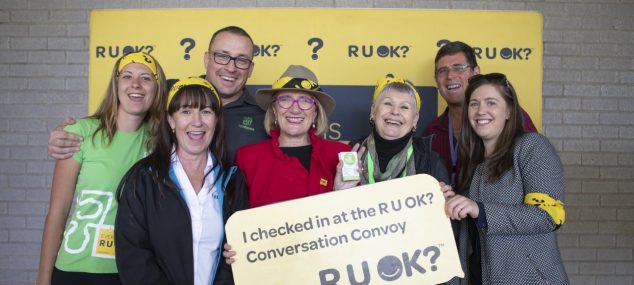
There’s more to say after “R U OK?”, and the Rural Adversity Mental Health Program (RAMHP) is here to help.
Now, more than ever, our rural communities need to check in with each other and stay connected.
R U OK? Day, Thursday 10 September, is a timely reminder to reach out to someone who might be struggling. If someone says they’re not okay, it’s also important to know what to say and learn how to start a conversation.
RAMHP Coordinator, Samantha Osborne said adverse events - such as drought, floods, bushfires and a global pandemic - have taken a toll on many people, financially, physically and mentally.
“These stressful events can cause feelings of worry and unease, especially when there are high levels of uncertainty involved,” Ms Osborne said.
“We need our communities to look out for each other. If you see someone you know who is showing signs they might be struggling, it is important to talk to them and to encourage them to take action.”
To help you know what to say after “R U OK?”, RAMHP has developed a new Guide – Having a Conversation, which includes tips on how to start a conversation.
1. Pick a time and a place – Pick a good time and find the right place to have the conversation
2. Be specific – Tell the person what you have noticed
3. Ask questions – Ask open-ended questions
4. Really listen – Listen without judgement, don’t interrupt and acknowledge their feelings.
5. Let them know it’s okay – Reassure them it’s okay to feel the way they do, and that help is available
6. Support and encourage – Support them in taking positive steps to improve their mental health
7. Follow-up – Stay in touch and check in again soon
8. Look after yourself – Make sure you’re going okay and ask for support if you need it
You can download a copy of the Guide here. You can also access other resources and information on the RAMHP website www.ramhp.com.au
RAMHP has also developed a new dedicated website for rural men - You Got This Mate - which provides action-focussed tips and information to help men reach their best possible mental health.
If you’re concerned about your own or someone else’s mental health, call the NSW Mental Health Line 1800 011 511 for advice, or call Lifeline on 13 11 14.
You can also contact your local RAMHP Coordinator through the RAMHP website www.ramhp.com.au for support and help to connect with services in the local area.
For guidelines on safe media reporting about COVID -19, suicide and mental ill-health, head to Mindframe at https://mindframe.org.au/